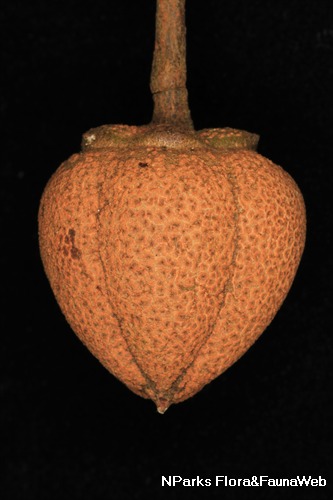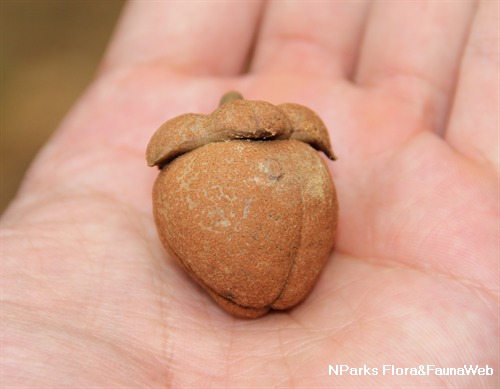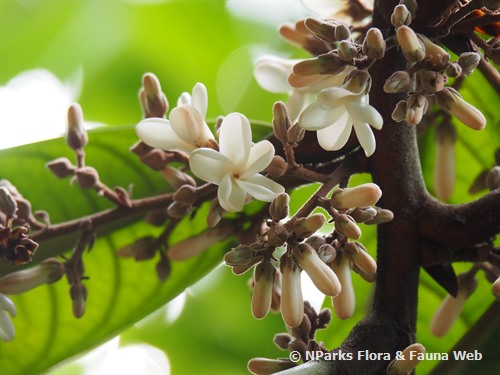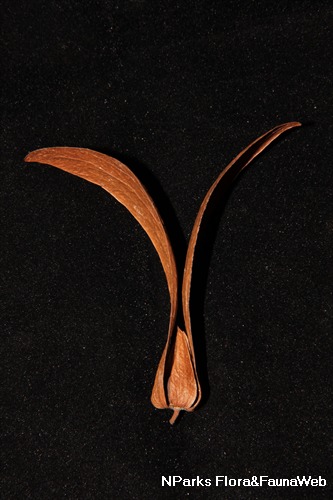-(18).jpg)
Back
Vatica ridleyana Brandis
| Family Name: | Dipterocarpaceae |
| Synonyms: | Pachynocarpus ridleyanus (Brandis) J.W.Anderson |
| Common Name: | Resak Buah Kana |
Vatica ridleyana or Resak Buah Kana is a medium sized Dipterocarp tree native to Singapore. It has leathery leaves with curved veins that are prominent below and cream white inflorescence along the nodes or tips of the branches. The fruit is a spindle-shaped, coarsely warty nut with small thickened calyx lobes attached to the bottom.
Name
Classifications and Characteristics
| Plant Division | Angiosperms (Flowering Seed Plants) (Dicotyledon) |
|---|---|
| Plant Growth Form | Tree (Medium (16m-30m)) |
Biogeography
| Native Distribution | Malesia |
|---|---|
| Native Habitat | Terrestrial (Primary Rainforest, Secondary Rainforest) |
| Preferred Climate Zone | Tropical |
| Local Conservation Status | Native to Singapore (Critically Endangered (CR)) |
Description and Ethnobotany
| Growth Form | It is a medium-sized tree with brown finely wrinkled twigs 2 - 3 mm wide. |
|---|---|
| Foliage | Leaves are simple, leathery, elliptic to narrowly egg to spoon-shaped, measuring 6 - 14 cm long by 3 - 7 cm wide, held on short petiole, 8 - 15 mm long. The leaves has a dull underside, slightly rolled in leaf margins and curved veins that are prominent below. The young parts tend to be covered in powdery downy hairs which quickly falls off. |
| Flowers | Flowers are cream white, borne on an inflorescence along the nodes and tip of the branches. The buds are spindle-shaped, 7 cm long by 2 cm wide. |
| Fruit | The fruit is held on a short, stout stalk. It comprise of a spindle-shaped, beaked, coarsely warty nut, 4.5 cm long by 1.8 cm wide and small but thickened calyx lobes that are attached to the base of the nut. |
| Habitat | Occurs in mixed Dipterocarp forest at low altitudes. <1> |
| Cultivation | It can be propagated by seed. |
Plant Care and Propagation
| Light Preference | Full Sun |
|---|---|
| Water Preference | Moderate Water |
| Plant Growth Rate | Slow |
| Rootzone Tolerance | Moist Soils, Well-Drained Soils |
| Propagation Method | Seed |
Foliar
| Foliage Retention | Evergreen |
|---|---|
| Mature Foliage Colour(s) | Green |
| Mature Foliage Texture(s) | Leathery |
| Foliar Type | Simple / Unifoliate |
| Foliar Arrangement Along Stem | Alternate |
| Foliar Attachment to Stem | Petiolate |
| Foliar Shape(s) | |
| Foliar Venation | Pinnate / Net |
| Foliar Apex - Tip | Acuminate, Acute |
| Foliar Base | Cuneate |
Non - Foliar and Storage
| Trunk Type (Non Palm) | Woody |
|---|---|
| Stem Type & Modification | Woody |
| Root Type | Underground (Tap Root) |
Floral (Angiosperm)
| Flower & Plant Sexuality | Bisexual Flowers , Bisexual Flowers |
| Flower Colour(s) | Cream / Off-White |
|---|
| Flower Grouping | Cluster / Inflorescence |
| Flower Location | Axillary, Terminal |
| Flower Symmetry | Radial |
| Inflorescence Type | Cyme, Raceme |
| Flowering Habit | Polycarpic |
Fruit, Seed and Spore
| Mature Fruit Colour(s) | Brown |
|---|---|
| Mature Fruit Texture(s) | Rough |
| Fruit Classification | Simple Fruit |
| Fruit Type |
References
| References | <1> Ashton, P.S. (1982). Vatica. In: Ashton, P.S. (ed.) Dipterocarpaceae. Flora Malesiana, ser. 1, Seed Plants, vol. 9, pt. 2, pp. 352. Leiden: Rijksherbarium. |
|---|
Image Repository
Others
| Master ID | 34314 |
|---|---|
| Species ID | 8727 |
| Flora Disclaimer | The information in this website has been compiled from reliable sources, such as reference works on medicinal plants. It is not a substitute for medical advice or treatment and NParks does not purport to provide any medical advice. Readers should always consult his/her physician before using or consuming a plant for medicinal purposes. |

.jpg)
.jpg)
-(2).jpg)
-(25).jpg)
-(28).jpg)
.jpg)



